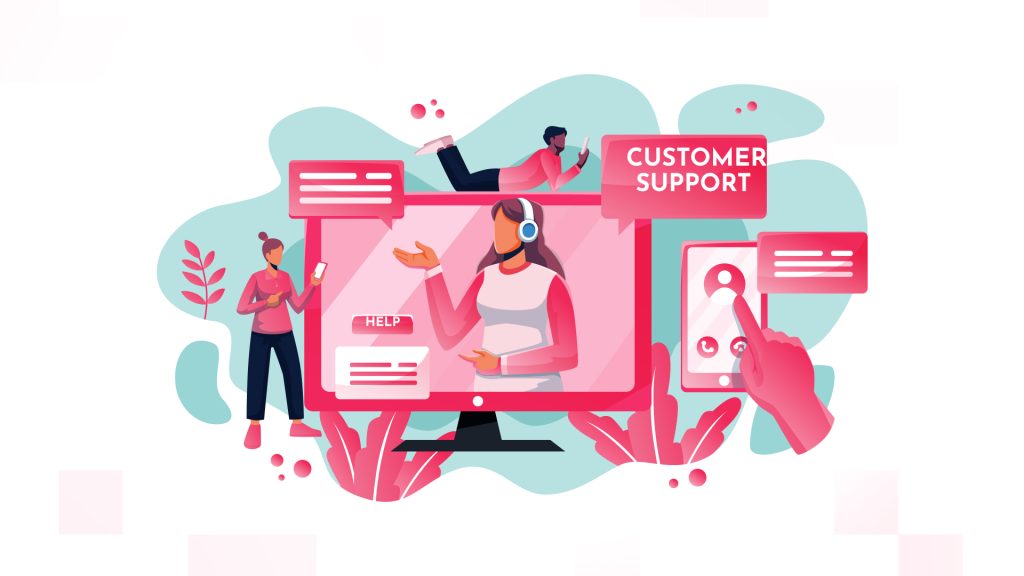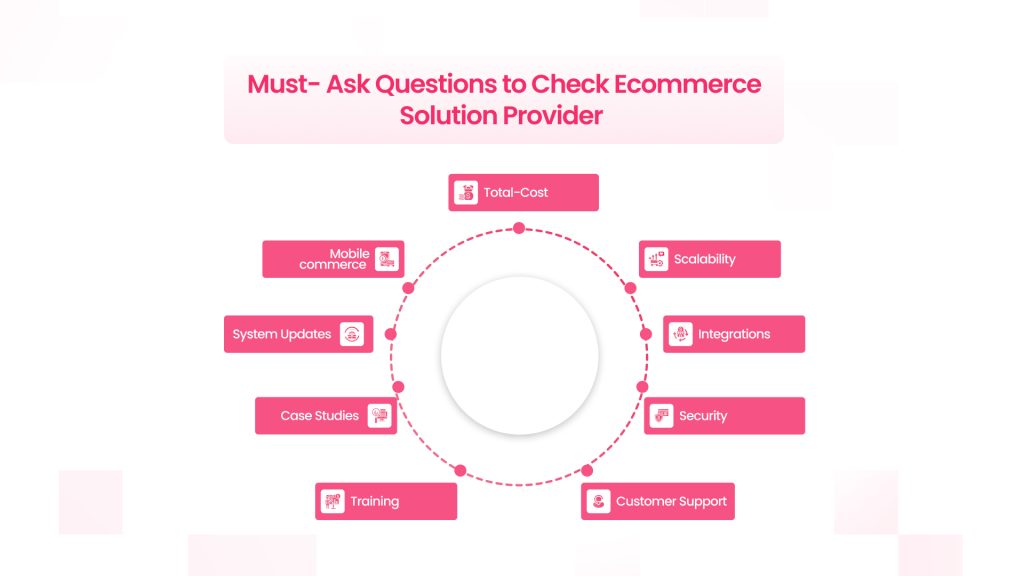Choosing the Right Ecommerce Solution Partner in 2025 and Questions to Ask Before Signing a New Contract.

For businesses thinking of going through the process of digital transformation, having the right ecommerce partner will certainly reduce most of their burden. As we move through 2025, businesses big and small will rely on an ecommerce platform to provide the optimal shopping experience and meet customer expectations while growing. The right selection of ecommerce partners will propel toward the achievement of this goal, but being with the wrong partner can lead to major setbacks, missed opportunities, and security issues.
There are numerous options available in the market; how can you choose the right ecommerce solution partner for you? The answer is by asking questions. Let’s discuss some questions you can ask your partner to get clarity on if it is the right fit for you.
Why Does Choosing the Right Ecommerce Solution Partner Matter?
Before discussing the selection criteria, let’s understand the context for this decision-making. A good ecommerce solution partner does much more than provide you with the technology and the tools to build and operate an online store. It also supports you in implementing a solution, along with providing strategic insights and novel solutions to problems. On the other hand, a bad ecommerce partner may lead to:
- Security vulnerabilities: Without adequate security protocols, your store might become a target for cyberattacks.
- Increased operational inefficiencies: A poorly integrated platform causes bottlenecks in your processes.
- Customer dissatisfaction: If the website is hard to navigate or the checkout process is too complex, customers will leave their carts, reducing customer satisfaction.
- Slow growth: Lack of scalability or innovation might stifle your business growth.
As we progress into 2025, the battle for success in ecommerce will only increase. Hence, it is absolutely important that your business stands ahead of the curve and, for that, you choose the right ecommerce solution partner.
Key Factors to Consider When Choosing an Ecommerce Solution Partner
Scalability and Flexibility
As your business grows, your ecommerce platform must scale up with it. You can be looking to expand product offerings, enter new markets, or handle increased traffic and transaction volumes. Whatever the case, your solution needs to be flexible enough to accommodate these changes.
Look for a partner that offers:
- Scalability: You can increase on-demand resources with cloud-based solutions.
- Modular systems: When one plans for an ecommerce platform to expand with business, you add new features; his approach should let you do that.
- Ease of customization: Your ecommerce solution should allow for alterations, including custom design elements or specifically needed functionalities based on industries.
Integration Capabilities
Your ecommerce platform should integrate flawlessly with other critical tools and systems that operate in the business. Your platform must support easy integration of all the different tools.
Key integration to consider Include:
- Shipping carriers: Integration with other logistics providers would assist in making a smoother shipping and fulfilment process while controlling the shipping cost.
- ERP systems: There should be hassle-free integration for inventory, order, and financial data flow.
- Payment gateways: The platform should support a variety of payment methods, such as credit/debit cards or digital wallets.
Here are a few tips to keep your payment gateway secure.
User Experience and Design
In ecommerce, user experience is what actually determines customer satisfaction and conversion rates. A well-designed website, which is intuitive and easy to navigate, will keep bringing back customers to your website. Your ecommerce partner should be able to provide you with a solution that will help you create a user-friendly and aesthetically pleasing online store.
Focus on:
Responsive design: Your site should be mobile-friendly since lots of people shop on their handsets.
Customizable theme and template: You need to find a platform that enables simple customization of the design without requiring expertise in coding.
Checkout experience: Make sure that this is simple and quick to minimize friction that leads to cart abandonment.
Security and Compliance
With the increased risk of attacks and data breaches, security has been the most important need of all time. Your ecommerce solution partner should then keep the highest security standards to protect sensitive customer data.
Ensure that your partner offers:
SSL Certification: It ensures a secure connection by encrypting the data that is travelling between you and your customer.
PCI-DSS Compliance: With this, you can relax about the payment card data because it ensures all the data is secure according to industry standards.
Two-Factor Authentication (2FA): This provides an extra layer of security, making your platform more secure from unauthorized access.
Want to keep your online store safe? Here’s a guide to making your data secure and online store safe.
Customer Support and Training
A responsive and knowledgeable support team is very important for the quick resolution of issues so that your business can continue running smoothly. Your ecommerce solution partner should be able to provide reliable customer service and be available when you need it.

Look for partners that offer:
24/7 support: Make sure they provide support whenever required, especially if you are working in multiple time zones.
Training and onboarding: Always ensure that the partner will provide your team with complete onboarding training with ongoing resources for updates, as your team will need it to utilize the full potential of the platform.
Dedicated Account Manager: A dedicated account manager which will work as point of contact for support and guidance.
Cost and Pricing Structure
The cost is always a deciding factor in determining the ecommerce partner, but it shouldn’t be the sole determinant. There needs to be an overall value the platform brings over features, support, and scalability critical to your business.
Ask Yourself:
What is the total cost of ownership?
This refers to the sum total of setup fees, subscription fees, transaction fees, and integration and customization costs.
Does the solution offer pay-as-you-go models?
Some ecommerce platforms offer tiered pricing. You want to have a partner that can accommodate your needs and budget as you grow.
Looking for advice for your eCommerce platform?
Our Experts Can Help!
Questions to Ask Before Signing a Contract with an Ecommerce Solution Partner

What is the total cost of the ecommerce solution?
While the cost is important, what’s included is equally as important. Do not hesitate to ask about a setup fee, transaction fees, hosting costs, and any added fees for customizations or integrations.
Can the platform scale with my business as it grows?
It also comes naturally that your ecommerce needs will change as your business starts to grow. Ask your provider about the scalability options they provide, including the ability of the developed solution to handle increased traffic, catalogue expansion and expanding the solution globally.
How does your solution integrate with third-party tools?
Once developed, you will need to integrate it with many different systems such as ERP, CRM and marketing platforms. Ask them about the availability of a developed system to integrate with the existing system so the existing workflow is not disturbed.
What kind of customer support do you offer?
Working in ecommerce is unpredictable; any issue can arise at any time. If not taken care of quickly, it can lead to a great loss. So, 24/7 Support becomes necessary. Ask them if they provide this or a dedicated account manager. It will ensure that you can contact the right person if needed.
What kind of security measures will be placed to ensure my data and customer data is safe?
Data security should be the first priority of any ecommerce solution as it deals with a lot of financial information. Inquire what security measures they use such as two factor authentication, SSL-encryption. Make sure they follow the compliance guidelines in their ecommerce solution, such as PCI-DSS.
What kind of training and resources will be available for my team?
Training will be essential to make sure your team is able to use the new platform to its full potential. Ask your ecommerce partner if they provide training sessions post-development or if they provide any other material for training, such as onboard sessions and ongoing educational resources, to ensure that the team will be updated about the new features in the future updates.
What is your portfolio, and have you worked on a similar project?
Ask them for their portfolio, case studies, or any references they can provide where they have worked on a similar project in the same industry. This will help you understand the experience of the ecommerce provider and check if they can meet your specific needs and business goals.
How will they handle system updates and maintenance?
Maintenance and updates are important for keeping you up to date with the competition. Inquire about whether they will provide system updates, how often the system will be updated, and how the maintenance will take place. Ask them what will be included in the updates and how they will manage any downtime.
What customization options will be available?
Every business has its specific needs and identity, and an ecommerce platform should be able to meet these specific needs and business goals while matching the identity of the brand. Ask them about the elements you will be able to customize, such as design, features and workflow.
Can I migrate data from my current platform easily?
While switching from your existing platform, it is important to ask for data migration process. You will ensure that all important data, including product, customer, and order data, is easily imported into your current website.
What type of reporting and analytics does the platform provide?
The ability to view key metrics of your site, such as sales data, customer behaviour, and the source of your traffic, will help you understand the performance of your website. Inquire with your ecommerce partner about the reporting and dashboard tools that they will provide and how easy it will be to generate and interpret this data.
How will the site handle mobile commerce?
Now, most customers are using their mobile phones to surf the internet. So, it becomes important for the platform to be mobile-optimized. Ask your ecommerce solution provider if they provide a mobile-first design, responsive templates and mobile checkout capabilities to provide a seamless mobile experience.
Need a future-proof Ecommerce store?
Our Experts Can Help!
Conclusion
Ecommerce solution partners for 2025 is a significant decision. Your business goals and all technical requirements must be considered to ensure what you are looking for in your website. An online retail environment is fast moving and competitive, so this ecommerce platform must meet today’s needs but also able to grow with you in years.
Keeping the key focus on scalability, user experience, security, customer support, and integrations can help you create the foundation of a successful ecommerce business with your chosen partner. The right questions asked before signing a contract—regarding costs, customization options, support services, and much more—will help you avoid potential pitfalls and ensure a smooth partnership.
Remember that an ecommerce platform is not just a tool; it’s actually a strategic asset that could drive growth, streamline operations, and boost customer satisfaction. This would place your business in a perfect position for success in the extremely competitive ecommerce landscape of 2025 and beyond, thanks to the right ecommerce solution partner.









